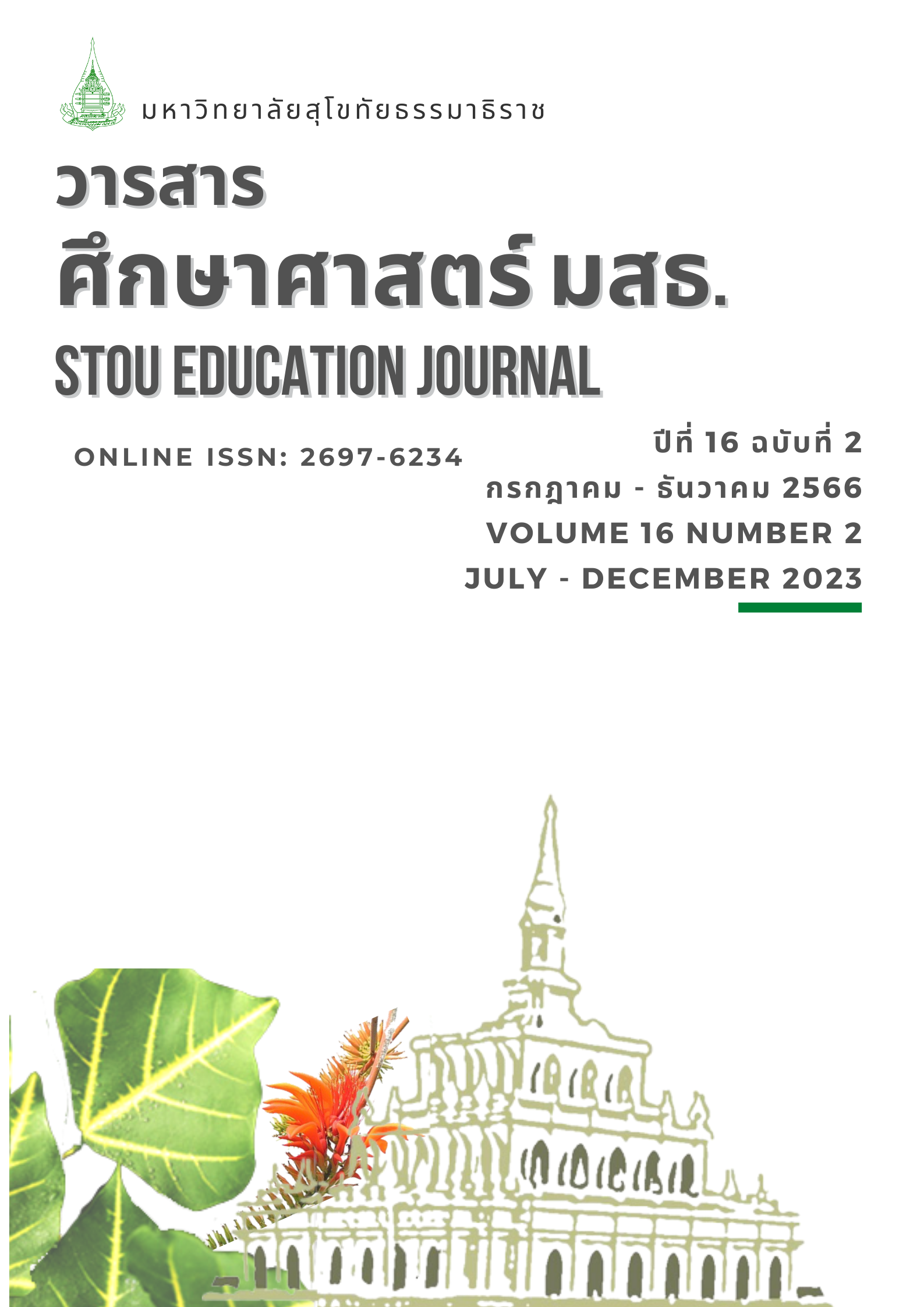Development of Learning Design for Competency-Based Learning of Science Teachers by Using Self-Directed Learning Strategies
Main Article Content
Abstract
The aims of this study were to develop a learning design for competency-based learning and study self-directed learning of science teachers through online professional development using self-directed learning strategies and to study best practices of online professional development using self-directed learning strategies. The study group comprised 15 in-service science teachers who applied for the five-month online training program. Data was collected from competency-based learning design assessments, self-directed learning assessments, reflection, and focus group interviews. The qualitative data analysis methods were employed. The findings revealed that science teachers' competency in designing competency-based learning management improved. The best practices included: 1) self-assessment tools, motivation, goal setting, encouraged teachers to design and plan competency-based learning management; 2) online media and learning resources were used to enhance knowledge in designing competency-based learning management; 3) self-evaluation and reflection, along with feedbacks from resource persons, enabled teachers and participants to improve and develop their competency-based learning design skills; and 4) training with long enough duration together with the establishment of good interaction between the resource persons and teachers affected the acceptance of and openness to learning on how to design competency-based learning and apply it in their classrooms.
Article Details
References
กชภัทร สงวนเครือ. (2564). โปรแกรมเสริมสร้างสมรรถนะครูในการจัดการเรียนรู้เชิงรุกตามแนวทางสะเต็มศึกษา สังกัดสํานักงานคณะกรรมการการศึกษาขั้นพื้นฐาน. วารสารสหวิทยาการวิจัยและวิชาการ, 1(1), 1-27.
กระทรวงศึกษาธิการ. (2552). หลักสูตรแกนกลางการศึกษาขั้นพื้นฐาน พุทธศักราช 2551. สำนักงานคณะกรรมการการศึกษาขั้นพื้นฐาน (พิมพ์ครั้งที่ 1). โรงพิมพ์ชุมนุมสหกรณ์การเกษตรแห่งประเทศไทย.
________________. (2560). ตัวชี้วัดและสาระการเรียนรู้แกนกลางกลุ่มสาระการเรียนรู้วิทยาศาสตร์ (ฉบับปรับปรุง พ.ศ. 2560) ตามหลักสูตรแกนกลางการศึกษาขั้นพื้นฐาน พุทธศักราช 2551. โรงพิมพ์ชุมนุมสหกรณ์การเกษตรแห่งประเทศไทย.
เขมณัฏฐ์ มิ่งศิริธรรม. (2552). การเรียนรู้ด้วยการนำตนเองบนเครือข่าย: Self-directed Learning on Web-based Learning. วารสารศึกษาศาสตร์มหาวิทยาลัยขอนแก่น, 32(1), 6-13.
คณะกรรมการอิสระเพื่อการปฏิรูปการศึกษา. (2562). รายงานพันธกิจด้านการปฏิรูปการศึกษา ผ่านหลักสูตรและการเรียนการสอนฐานสมรรถนะ. https://www.thaiedreform.org/wp-content/uploads/2019/08/Core_competency_11.pdf
ดวงใจ สีเขียว, ลัดดา หวังภาษิต, และ สุมาลี เชื้อชัย. (2565). การพัฒนาหลักสูตรฝึกอบรมเพื่อส่งเสริมสมรรถนะการออกแบบ การจัดการเรียนรู้สำหรับครูประถมศึกษาในการเสริมสร้าง สมรรถนะการคิดขั้นสูงของผู้เรียน. วารสารมนุษยศาสตร์และสังคมศาสตร์ มหาวิทยาลัยอุบลราชธานี, 13(1), 223-247.
นารีรัตน์ รักวิจิตรกุล. (2560). การพัฒนาวิชาชีพครู.วารสารศึกษาศาสตร์ มหาวิทยาลัยมหาสารคาม, 11(1), 21-33.
สนธยา หลักทอง และ เผชิญ กิจระการ. (2564). การพัฒนารูปแบบการฝึกอบรมแบบผสมผสานตามหลักการนำตนเองเพื่อเสริมสร้างสมรรถนะการรู้ดิจิทัล สำหรับครูในสังกัดสำนักงานคณะกรรมการการศึกษาขั้นพื้นฐาน. วารสารมนุษยศาสตร์และสังคมศาสตร์ มหาวิทยาลัยนครพนม, 11(2), 197-209.
สำนักงานเลขาธิการสภาการศึกษา. (2562). แนวทางการพัฒนาสมรรถนะผู้เรียน ระดับการศึกษา ขั้นพื้นฐาน. 21 เซ็นจูรี.
________. (2564). แนวทางการพัฒนาสมรรถนะผู้เรียนระดับการศึกษาขั้นพื้นฐานในช่วงเปลี่ยนผ่านสู่หลักสูตรฐานสมรรถนะ. กลุ่มมาตรฐานการศึกษา สำนักมาตรฐานการศึกษาและพัฒนาการเรียนรู้.
Avalos, B. (2011). Teacher professional development in teaching and teacher education over ten years. Teaching and Teacher Education, 27(1), 10-20. https://doi.org/10.1016/j.tate.2010.08.007
Babair, M. (2023). The skill development of 21st century teachers on the basis of applying the concepts of instructional design skills. Journal of Higher Education Theory & Practice, 23(1), 46-62. https://doi.org/10.33423/jhetp.v23i1.5791
Charokar, K., & Dulloo, P. (2022). Self-directed learning theory to practice: A footstep towards the path of being a life-long learner. J Adv Med Educ Prof, 10(3), 135-144. https://doi.org/10.30476/JAMP.2022.94833.1609
Darling-Hammond, L. (2000). Teacher quality and student achievement. Education Policy Analysis Archives, 8, 1-44. https://doi.org/10.14507/epaa.v8n1.2000
Furlong, J. (2013). Globalisation, neoliberalism, and the reform of teacher education in England. The Educational Forum, 77, 28-50. https://doi.org/10.1080/00131725.2013.739017
Garrison, D. (1997). Self-directed learning: Toward a comprehensive model. Adult Education Quarterly - ADULT EDUC QUART, 48, 18-33. https://doi.org/10.1177/074171369704800103
Golob, H. M. (2012). The impact of teacher's professional development on the results of pupils at national assessment of knowledge. Procedia - Social and Behavioral Sciences, 47, 1648-1654. https://doi.org/10.1016/j.sbspro.2012.06.878
Guglielmino, L. M. (2013). The case for promoting self-directed learning in formal educational institutions. SA-eDUC Journal, 10(2), 1-18.
Gunawan S., Soetarno J., & Sajidan, S. (2016). Blended learning-based self-directed learning on classroom action research training to improve teacher competency research. Journal of Education and Learning, 10(4), 327-334.
Hewson, P. W. (2013). Teacher professional development in science. In N.G. Lederman & S.K. Abell (Eds.) Handbook of research on science education (pp. 1179-1203). Routledge.
Hong, W. P. (2011). An international study of the changing nature and role of school curricula: From transmitting content knowledge to developing students’ key competencies. Asia Pacific Education Review, 13(1), 27-37. https://doi.org/10.1007/s12564-011-9171-z
Hosseini Bidokht, M., & Assareh, A. (2011). Life-long learners through problem-based and self-directed learning. Procedia Computer Science, 3, 1446-1453. https://doi.org/10.1016/j.procs.2011.01.028
Kabilan, M. (2005). Online professional development: A literature analysis of teacher competency. Journal of Computing in Teacher Education, 21(2), 51-57.
Knowles, M.S. (1975). Self-directed learning: A guide for learners and teachers. Associate Press.
Kraft, M. A., Blazar, D., & Hogan, D. (2018). The effect of teacher coaching on instruction and achievement: a meta-analysis of the causal evidence. Review of Educational Research, 88(4), 547-588. https://doi.org/10.3102/0034654318759268
Ma, N., Xin, S., & Du, J. Y. (2018). A Peer Coaching-based Professional Development Approach to Improving the Learning Participation and Learning Design Skills of In-Service Teachers. Educational Technology & Society, 21 (2), 291–304.
Patton, M. (1990). Qualitative evaluation and research methods. Sage.
Sawatsky, A., Ratelle, J., Bonnes, S., Egginton, J., & Beckman, T. (2017). A model of self-directed learning in internal medicine residency: A qualitative study using grounded theory. BMC Medical Education, 17(31), 1-9. https://doi.org/10.1186/s12909-017-0869-4
Serdenciuc, N. L. (2013). Competency-based education – Implications on teachers’ training. Procedia - Social and Behavioral Sciences, 76, 754-758. https://doi.org/10.1016/j.sbspro.2013.04.200
Song, L., & Hill, J. R. (2007). A conceptual model for understanding self-directed learning in online environments. Journal of Interactive Online Learning, 6(1), 27-42.


